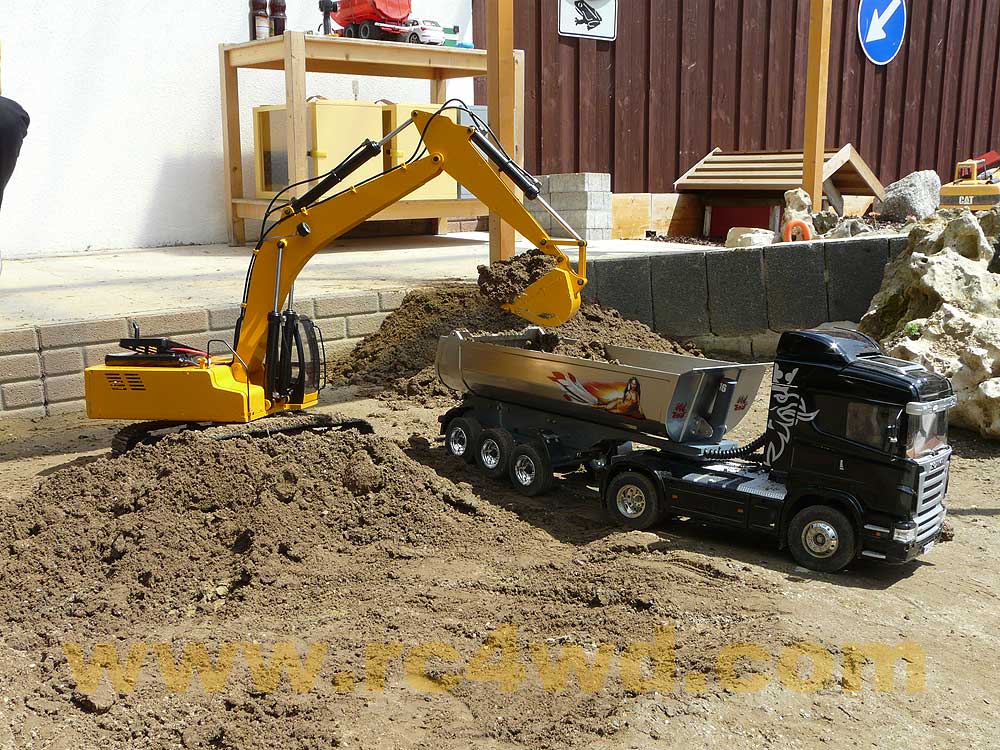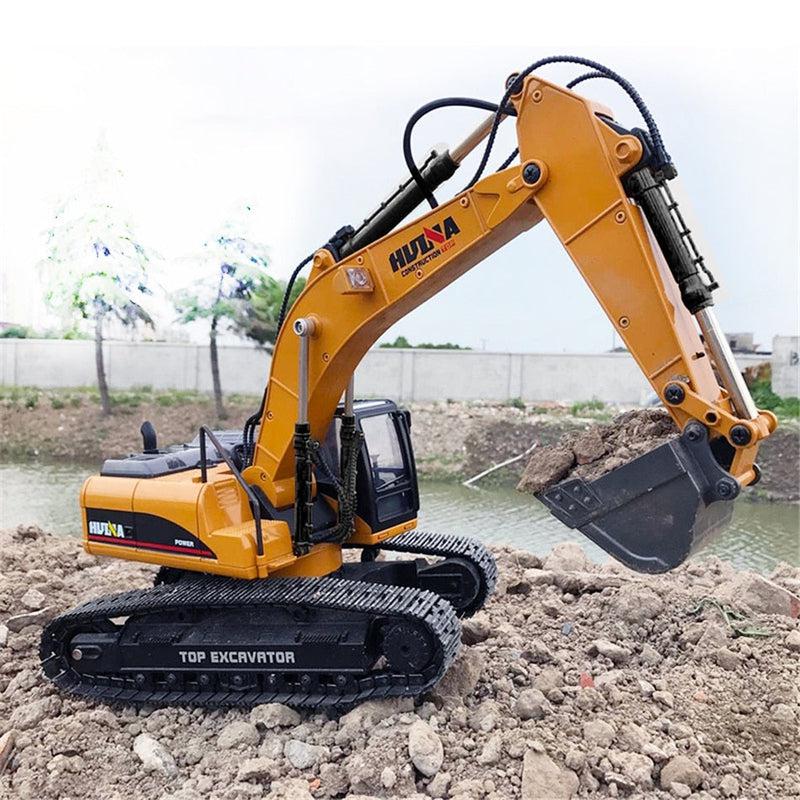Discover the Importance of Excavator in Modern Construction Projects
Excavators are crucial tools in contemporary construction jobs. Their versatility enables them to carry out a large range of jobs, from digging and grading to demolition and site preparation. Advanced features, such as hydraulic add-ons and GPS, enhance their capacities and performance on job sites. As the sector evolves, the significance of excavators grows a lot more. Comprehending their role can disclose insights right into the future of building techniques. What exists in advance for these makers?
The Flexibility of Excavators in Various Projects
Excavators are usually associated with large-scale construction projects, their adaptability permits them to be utilized in a wide variety of applications, from property landscaping to energy maintenance. In urban settings, excavators can browse limited areas to dig structures for homes or install drain systems. Their capability to execute delicate tasks makes them excellent for landscaping jobs, where they can dig deep into for ponds or plant trees. Furthermore, excavators play a crucial role in utility upkeep, successfully excavating trenches for pipes or wires without interrupting surrounding locations. In farming applications, they assist in land clearing and dirt prep work. Their flexibility enables them to be furnished with different add-ons, enhancing their functionality throughout different tasks. This diverse nature of excavators not just improves different construction processes however additionally shows their important duty in modern-day infrastructure development and maintenance.
Key Features and Kinds Of Excavators
The conversation on key features and sorts of excavators highlights the necessary attributes that make these devices vital in construction. Different excavator types, each made for details jobs, demonstrate their versatility and effectiveness throughout different applications. rc excavator. Understanding these attributes and categories is vital for enhancing their usage in modern-day building and construction tasks
Excavator Enters Review
Excavators play a pivotal duty in modern construction, using versatility and effectiveness across various jobs. These hefty machinery units come in several types, each tailored for specific applications. The most typical types consist of spider excavators, known for their security on uneven terrain, and wheeled excavators, which offer greater flexibility on smooth surfaces. Miniature excavators are favored for small projects and limited spaces, while long-reach excavators are designed for deep excavating. In addition, there are specialized excavators, such as hydraulic excavators, which improve power and accuracy. Each kind features distinct capabilities, making them important for jobs ranging from digging and grading to demolition and material handling. Recognizing these variants permits construction professionals to select the right excavator for their project requires.
Trick Features Explained
Understanding the essential functions of excavators enhances their efficient application in building tasks. Excavators are characterized by their powerful hydraulic systems, which offer the required force for digging, training, and moving materials. Their articulated arms permit a large range of movement, facilitating specific procedures in confined areas. Furthermore, the selection of attachments, such as containers, grapples, and augers, expands their convenience to satisfy various job requirements. The size and weight of excavators additionally add to their stability and ability to move on various surfaces. Innovations in technology have actually led to the assimilation of General practitioner and automation, enhancing accuracy and efficiency in excavation jobs. These features jointly position excavators as important devices in contemporary building and construction.
Applications in Building
Changing building and construction sites, excavators play a crucial function across different applications, ranging from household building jobs to large framework advancements. These functional equipments are outfitted for tasks such as excavating foundations, trenching for energies, and site grading. Different sorts of excavators, including crawler, wheeled, and mini excavators, provide particular advantages customized to the project requirements. Spider excavators stand out in harsh surfaces, while wheeled excavators offer wheelchair on smooth surface areas. Miniature excavators are suitable for constrained areas, making them popular in metropolitan settings. The efficiency and power of excavators substantially accelerate building and construction processes, ensuring prompt job conclusion. Their adaptability further enhances their significance, enabling construction teams to deal with a diverse array of difficulties effectively.
Enhancing Effectiveness and Productivity on Job Sites
Taking full advantage of effectiveness and efficiency on work websites is a crucial goal in modern-day building. Excavators play a critical role in achieving this goal by streamlining numerous jobs. Their capacity to do several functions-- such as grading, lifting, and digging-- minimizes the demand for additional devices, thus conserving time and resources.Moreover, excavators enhance operations by enabling faster conclusion of tasks. With sophisticated attributes like hydraulic attachments and GPS technology, they can execute specific procedures that lessen errors and revamp. This accuracy not just improves the top quality of job however likewise optimizes product usage, adding to set you back savings.The versatility of excavators allows them to adapt to various site conditions, making sure that jobs advance smoothly no matter of obstacles. By integrating excavators into building and construction procedures, groups can significantly enhance their general productivity, causing prompt job completion and boosted success.
Safety Advantages of Using Excavators
Excavators significantly improve security on building websites via enhanced operator visibility and decreased hands-on labor dangers. By offering drivers with a clear sight of their environments, excavators aid to avoid injuries and mishaps. Additionally, the equipment lessens the need for workers to take part in harmful manual tasks, additionally promoting a safer workplace.
Improved Driver Visibility
Construction sites can be chaotic and loaded with possible threats, boosted operator exposure plays a crucial role in ensuring safety and security when making use of excavators. Modern excavators are made with huge, unblocked home windows and purposefully positioned mirrors, allowing drivers to keep a clear view of their surroundings (rc excavator). This enhanced exposure is important for identifying pedestrians, various other equipment, and numerous challenges, considerably reducing the risk of crashes. Additionally, several excavators integrate sophisticated innovation, such as cams and sensors, to supply operators with additional point of views, further enhancing recognition. The capacity to see even more plainly not only aids in reliable procedure yet additionally promotes a more secure job setting, making it simpler for drivers to browse intricate building and construction websites without compromising security requirements
Lowered Handbook Labor Threats
When manual work is reduced with making use of excavators, numerous security benefits arise, significantly improving the wellness of building and construction workers. Excavators minimize the physical stress associated with hefty training and recurring tasks, successfully lowering the danger of bone and joint injuries. By automating processes such as excavating, grading, and relocating products, they click over here now allow workers to preserve a much safer range from prospective threats. Additionally, excavators are equipped with advanced safety attributes, such as rollover security systems and improved operator functional designs, Get More Info which further protect personnel on site. The result is a significant reduction in work environment accidents and injuries, causing raised performance and spirits amongst building groups. Ultimately, the adoption of excavators contributes to a safer and much more effective building and construction setting.
Excavators in Earthmoving and Website Prep Work
In modern-day construction, a substantial part of earthmoving and site preparation tasks relies upon the performance and convenience of excavators. These makers are created to manage different soil types and surface, making them indispensable for rating, excavating, and trenching activities. Their hydraulic arms can be geared up with different add-ons, such as augers and pails, allowing drivers to tailor their method based on details task requirements.Excavators excel at relocating big quantities of earth promptly and effectively, which speeds up the overall building and construction timeline. They can browse limited rooms and testing sites where traditional devices might have a hard time, enhancing productivity. Furthermore, the accuracy of excavators warranties that website prep work sticks to stringent specs, decreasing the risk of errors that could lead to expensive rework.
The Role of Excavators in Demolition Tasks
Excavators play an important function in demolition jobs, as they possess the power and dexterity required to dismantle structures successfully. Geared up with numerous add-ons such as hydraulic breakers, shears, and grapples, these equipments can adjust to different demolition demands, whether for little buildings or huge commercial websites. Their versatility makes it possible for drivers to deal with complicated projects while preserving safety and security and precision.In addition to their demolition abilities, excavators promote debris elimination, guaranteeing that job websites continue to be well organized and risk-free. By damaging down structures into manageable pieces, they permit for structured clearing and recycling of materials, lining up with contemporary sustainability efforts.Moreover, excavators can access tight areas and browse irregular surface, making them indispensable in metropolitan demolition tasks. Overall, their robust design and multifunctionality make excavators an important property in the demolition stage of building and construction, contributing considerably to job timelines and efficiency.


Future Patterns in Excavator Technology and Use
As the building sector evolves, innovations in excavator technology are poised to change their use and performance noticeably. One significant fad is the integration of automation and synthetic intelligence, permitting excavators to run with minimal human intervention. This shift will certainly enhance precision in tasks such as grading and trenching, lowering human mistake and boosting productivity.Additionally, the increase of hybrid and electrical excavators is shaping an extra lasting building atmosphere, lowering carbon discharges and gas expenses. Boosted telematics systems are likewise arising, allowing real-time surveillance of maker efficiency and upkeep requirements, which can result in much better operational efficiency and longer devices lifespan.Moreover, improvements in attachment modern technology are expanding the flexibility of excavators, enabling them to execute a broader variety of tasks. The combination of these fads shows a future where excavators are smarter, greener, and much more versatile, inevitably reshaping building and construction project characteristics.
Frequently Asked Questions
How Do Excavators Compare to Other Construction Equipment?
Excavators, characterized by their convenience and power, master address digging and earthmoving compared to various other machinery. Their capability to carry out different tasks, including lifting and demolition, makes them vital in building and construction projects, improving total performance.

What Is the Ordinary Lifespan of an Excavator?
The ordinary life expectancy of an excavator usually varies from 7,000 to 10,000 operating hours, relying on upkeep, use problems, and design. Correct care can expand this life expectancy, making sure peak performance throughout its operational years.
Just How Are Excavators Maintained for Optimal Performance?
Excavators need routine maintenance for peak performance, consisting of routine examinations, liquid checks, filter replacements, and prompt repair work. Carrying out a preventative upkeep timetable aids lengthen their life expectancy and assurances reliable operation in numerous building and construction settings.
What Are the Expenses Related To Getting an excavator vs. leasing?
The expenses related to leasing versus purchasing an excavator differ substantially. Renting out deals lower upfront expenses yet can gather gradually, while buying requires a considerable preliminary financial investment, however supplies lasting savings and possession ownership benefits.
What Training Is Required to Operate an Excavator?
Running an excavator calls for specialized training, typically consisting of security protocols, machine procedure techniques, and ecological awareness. Certification programs usually mandate useful experience, allowing operators to deal with various jobs effectively while making sure conformity with sector laws. The most usual kinds consist of spider excavators, understood for their security on uneven surface, and wheeled excavators, which give greater mobility on smooth surfaces. Miniature excavators are favored for limited spaces and small tasks, while long-reach excavators are created for deep excavating. Additionally, there are customized excavators, such as hydraulic excavators, which enhance power and precision. Various types of excavators, including crawler, wheeled, and mini excavators, give details benefits tailored to the task requirements. Crawler excavators succeed in rough terrains, while wheeled excavators use movement on smooth surface areas.